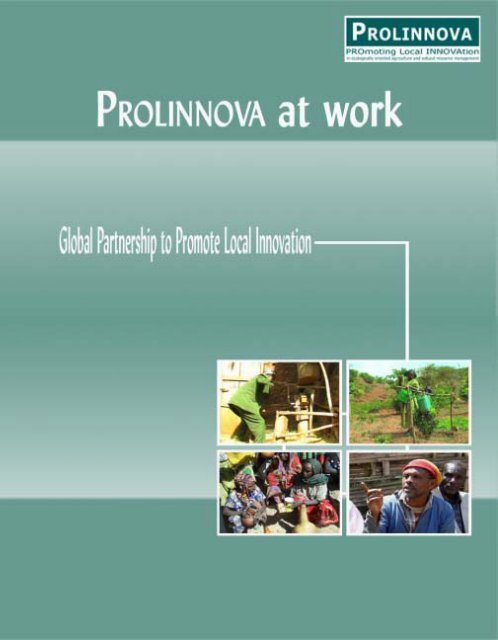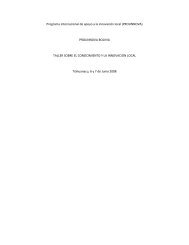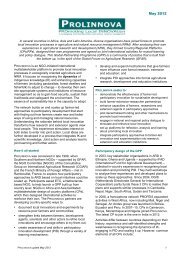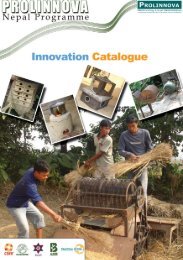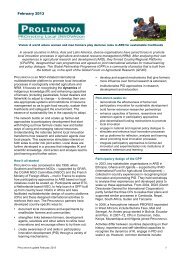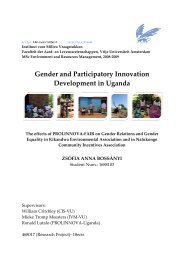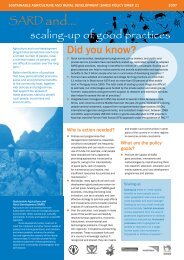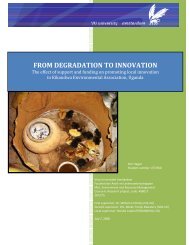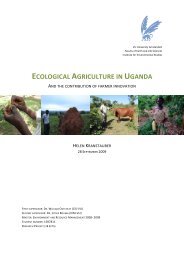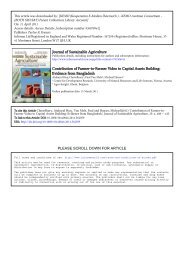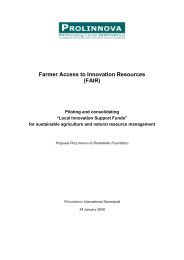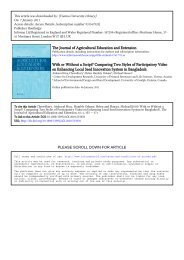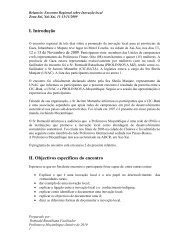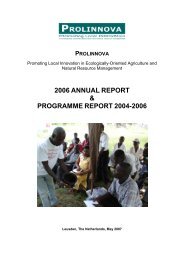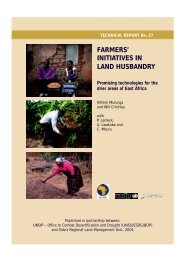Brochure - Prolinnova at Work: Highlights in 2004 - 2006
Brochure - Prolinnova at Work: Highlights in 2004 - 2006
Brochure - Prolinnova at Work: Highlights in 2004 - 2006
Create successful ePaper yourself
Turn your PDF publications into a flip-book with our unique Google optimized e-Paper software.
ROLINNOVA <strong>at</strong> work...<br />
PROLINNOV<br />
Global Partnership to Promote Local Innov<strong>at</strong>ion<br />
Introduc<strong>in</strong>g Particip<strong>at</strong>ory Innov<strong>at</strong>ion Development (PID)<br />
Local <strong>in</strong>nov<strong>at</strong>ion – the process by which people <strong>in</strong> a given locality discover or develop new and<br />
better ways of do<strong>in</strong>g th<strong>in</strong>gs – us<strong>in</strong>g the locally available resources and on their own <strong>in</strong>iti<strong>at</strong>ive,<br />
without the pressure or direct support from formal research or development agents.<br />
Local <strong>in</strong>nov<strong>at</strong>ions (with an ‘s’) – the outcomes of this cre<strong>at</strong>ive process, for example, farm<strong>in</strong>g<br />
techniques or ways or organis<strong>in</strong>g work th<strong>at</strong> are new for th<strong>at</strong> particular locality.<br />
Local <strong>in</strong>nov<strong>at</strong>ion = process<br />
Local <strong>in</strong>nov<strong>at</strong>ions = outcomes of the process<br />
Who are farmer <strong>in</strong>nov<strong>at</strong>ors? – All farmers <strong>in</strong>nov<strong>at</strong>e to some extent, however little, many of them<br />
simply <strong>in</strong> order to survive. But the <strong>in</strong>nov<strong>at</strong>ors valued by PROLINNOVA are those who are do<strong>in</strong>g someth<strong>in</strong>g<br />
outstand<strong>in</strong>g to improve their lives, their communities and/or their n<strong>at</strong>ural environment. They are<br />
local people who develop new ways of farm<strong>in</strong>g or manag<strong>in</strong>g n<strong>at</strong>ural resources, build<strong>in</strong>g on local<br />
knowledge but us<strong>in</strong>g new ideas from various sources, <strong>in</strong>clud<strong>in</strong>g their own cre<strong>at</strong>ivity.<br />
Wh<strong>at</strong> is PID? – Particip<strong>at</strong>ory Innov<strong>at</strong>ion Development is a process <strong>in</strong> which farmers and other<br />
stakeholders engage <strong>in</strong> jo<strong>in</strong>t explor<strong>at</strong>ion and experiment<strong>at</strong>ion, lead<strong>in</strong>g to new technologies or<br />
socio-<strong>in</strong>stitutional arrangements, such as new ways of regul<strong>at</strong><strong>in</strong>g access to resources or new ways<br />
of community organis<strong>at</strong>ion, for more susta<strong>in</strong>able livelihoods. It often uses local <strong>in</strong>nov<strong>at</strong>ions as an<br />
entry po<strong>in</strong>t to jo<strong>in</strong>t research.<br />
PROLINNOVA is an <strong>in</strong>tern<strong>at</strong>ional <strong>in</strong>iti<strong>at</strong>ive aimed <strong>at</strong> PROmot<strong>in</strong>g Local INNOVAtion <strong>in</strong> ecologically-oriented<br />
agriculture and n<strong>at</strong>ural resource management (NRM). It is a “Global Partnership Programme”<br />
under the umbrella of the Global Forum on Agricultural Research (GFAR). This <strong>in</strong>tern<strong>at</strong>ional<br />
community of practice, learn<strong>in</strong>g and advocacy was <strong>in</strong>iti<strong>at</strong>ed by NGOs but <strong>in</strong>volves also governmental<br />
organis<strong>at</strong>ions concerned with agricultural research and development (ARD). It focuses on recognis<strong>in</strong>g<br />
the dynamics of <strong>in</strong>digenous knowledge and on learn<strong>in</strong>g how to strengthen the capacities of farmers<br />
to adjust to chang<strong>in</strong>g conditions – to develop and adapt their own site-appropri<strong>at</strong>e systems and<br />
<strong>in</strong>stitutions of resource management.
Wh<strong>at</strong> does PROLINNOVA<br />
seek?<br />
Vision<br />
A world <strong>in</strong> which farmers play decisive roles <strong>in</strong> agricultural<br />
research and development for susta<strong>in</strong>able livelihoods.<br />
Mission<br />
To foster a culture of mutual learn<strong>in</strong>g and synergy <strong>in</strong> local<br />
<strong>in</strong>nov<strong>at</strong>ion processes <strong>in</strong> agriculture and NRM.<br />
Goal<br />
To develop and <strong>in</strong>stitutionalise partnerships and<br />
methodologies th<strong>at</strong> promote processes of local <strong>in</strong>nov<strong>at</strong>ion<br />
for environmentally-sound use of n<strong>at</strong>ural resources.<br />
Agali Awamu Farmers’ Associ<strong>at</strong>ion:<br />
discuss<strong>in</strong>g the potential for a Local<br />
Innov<strong>at</strong>ion Research Fund programme<br />
ROLINNOVA seeks to:<br />
PROLINNO<br />
• demonstr<strong>at</strong>e the effectiveness of user-led<br />
<strong>in</strong>nov<strong>at</strong>ion for susta<strong>in</strong>able development<br />
• build strong farmer-extension-researcher<br />
partnerships<br />
• enhance capacities of farmers, researchers,<br />
extensionists and policymakers <strong>in</strong> particip<strong>at</strong>ory<br />
approaches<br />
• stimul<strong>at</strong>e n<strong>at</strong>ional and regional policy dialogue<br />
to favour local <strong>in</strong>nov<strong>at</strong>ion<br />
• set up pl<strong>at</strong>forms <strong>at</strong> various levels for reflection,<br />
analysis and learn<strong>in</strong>g about promot<strong>in</strong>g local<br />
<strong>in</strong>nov<strong>at</strong>ion<br />
• <strong>in</strong>tegr<strong>at</strong>e particip<strong>at</strong>ory approaches to farmer-led<br />
<strong>in</strong>nov<strong>at</strong>ion and experiment<strong>at</strong>ion <strong>in</strong>to research,<br />
extension and educ<strong>at</strong>ion <strong>in</strong>stitutions<br />
• pilot decentralised fund<strong>in</strong>g mechanisms to<br />
promote local <strong>in</strong>nov<strong>at</strong>ion.<br />
Monitor<strong>in</strong>g the PROLINNOVA activities.<br />
3
ROLINNOVA <strong>at</strong> a glance...<br />
PROLINNOV<br />
In each of the n<strong>in</strong>e countries <strong>in</strong>volved <strong>in</strong> PROLINNOVA by <strong>2006</strong> – Cambodia, Ethiopia, Ghana,<br />
Nepal, Niger, South Africa, Sudan, Tanzania and Uganda – a local NGO convened the major<br />
stakeholders <strong>in</strong> ARD to design and implement a “Country Programme” (CP). The plans and activities<br />
undertaken differ accord<strong>in</strong>g to the experience and self-identified strengths and gaps <strong>in</strong> each country,<br />
but common objectives <strong>in</strong>clude:<br />
• to build research and development partnerships through recognis<strong>in</strong>g local <strong>in</strong>nov<strong>at</strong>ion and<br />
engag<strong>in</strong>g <strong>in</strong> jo<strong>in</strong>t farmer-led experiment<strong>at</strong>ion<br />
• to strengthen the capacities of community-based organis<strong>at</strong>ions (CBOs), other NGOs and<br />
governmental organis<strong>at</strong>ions <strong>in</strong> PID<br />
• to <strong>in</strong>fluence governmental policy and build local capacities to engage mean<strong>in</strong>gfully <strong>in</strong><br />
policy dialogue.<br />
At the global level, the objectives are:<br />
• to support local partners <strong>in</strong> build<strong>in</strong>g strong Country Programmes through backstopp<strong>in</strong>g<br />
and facilit<strong>at</strong>ion of shar<strong>in</strong>g and learn<strong>in</strong>g<br />
• to promote worldwide awareness and credibility of farmer <strong>in</strong>nov<strong>at</strong>ion and PID.<br />
Involv<strong>in</strong>g multiple stakeholders <strong>in</strong> the<br />
CPs promotes shared ownership of<br />
PROLINNOVA’s pr<strong>in</strong>ciples and strong<br />
commitment to work<strong>in</strong>g together to<br />
<strong>in</strong>stitutionalise PID. By follow<strong>in</strong>g a<br />
country-level as well as an <strong>in</strong>tern<strong>at</strong>ional<br />
orient<strong>at</strong>ion, PROLINNOVA can gener<strong>at</strong>e<br />
<strong>in</strong>tern<strong>at</strong>ional public goods while<br />
respond<strong>in</strong>g to the unique needs <strong>in</strong> the<br />
different countries <strong>in</strong> which it oper<strong>at</strong>es.<br />
By l<strong>in</strong>k<strong>in</strong>g local action with a global<br />
agenda, PROLINNOVA demonstr<strong>at</strong>es th<strong>at</strong><br />
site-specific work can feed effectively<br />
<strong>in</strong>to higher-level policy dialogue.<br />
PROLINNOVA was conceived <strong>in</strong> December<br />
1999, when Southern and Northern<br />
NGOs – with support from the GFAR,<br />
the Non-Governmental Organis<strong>at</strong>ions<br />
Committee (NGOC) of the<br />
Consult<strong>at</strong>ive Group on Intern<strong>at</strong>ional<br />
Stakeholders <strong>in</strong> PROLINNO<br />
ROLINNOVA Country Partnerships<br />
Farmers<br />
9%<br />
Research<br />
13%<br />
University<br />
16%<br />
Other<br />
4% NGO<br />
36%<br />
MoA/Extension<br />
22%<br />
4
Agricultural Research (CGIAR) and the French M<strong>in</strong>istry<br />
of Foreign Affairs – met <strong>in</strong> France to identify ways to<br />
scale up particip<strong>at</strong>ory approaches to ARD. At this<br />
meet<strong>in</strong>g, ETC EcoCulture, a Netherlands-based<br />
NGO, was asked to facilit<strong>at</strong>e the process of build<strong>in</strong>g<br />
a multi-n<strong>at</strong>ional and multi-stakeholder PROLINNOVA<br />
programme.<br />
In 2003, with support from IFAD (Intern<strong>at</strong>ional Fund<br />
for Agricultural Development), key ARD organis<strong>at</strong>ions<br />
<strong>in</strong> Ethiopia, Ghana and Uganda collected local<br />
experiences rel<strong>at</strong>ed to farmer <strong>in</strong>nov<strong>at</strong>ion and PID and<br />
held workshops to draw up country-level plans to scale up and <strong>in</strong>stitutionalise these approaches. In<br />
<strong>2004</strong>–06, fund<strong>in</strong>g from DGIS (Netherlands Director<strong>at</strong>e General for Intern<strong>at</strong>ional Cooper<strong>at</strong>ion)<br />
allowed them to start implement<strong>in</strong>g their plans and to support similar process <strong>in</strong> six more countries<br />
(Cambodia, Nepal, Niger, South Africa, Sudan and Tanzania).<br />
In l<strong>at</strong>e <strong>2006</strong>, a sister programme (PROFEIS – Promot<strong>in</strong>g Farmer Innov<strong>at</strong>ion and Experiment<strong>at</strong>ion <strong>in</strong><br />
the Sahel) received funds from Misereor to expand the activities <strong>in</strong> francophone West Africa beyond<br />
Niger to <strong>in</strong>clude also Senegal, Mali and Burk<strong>in</strong>a Faso. Interested organis<strong>at</strong>ions <strong>in</strong> the Andes,<br />
Kenya, Mozambique and the South Pacific have also started <strong>in</strong>iti<strong>at</strong>ives to promote local <strong>in</strong>nov<strong>at</strong>ion.<br />
Particip<strong>at</strong>ory programme management<br />
Farmer <strong>in</strong>nov<strong>at</strong>ors <strong>in</strong> northern Ethiopia w<strong>at</strong>ch<br />
a video on farmer <strong>in</strong>nov<strong>at</strong>ion.<br />
Although the <strong>in</strong>stitutional set-up differs between countries, the general p<strong>at</strong>tern is th<strong>at</strong> a local NGO<br />
serves as secretari<strong>at</strong> for a N<strong>at</strong>ional Steer<strong>in</strong>g Committee (NSC) made up of people from<br />
governmental research, extension and educ<strong>at</strong>ion <strong>in</strong>stitutions, other NGOs and farmer organis<strong>at</strong>ions.<br />
The NSC def<strong>in</strong>es the str<strong>at</strong>egies of the CP, rang<strong>in</strong>g from farmer-led experiment<strong>at</strong>ion to n<strong>at</strong>ionallevel<br />
advocacy. A smaller Core Team<br />
or <strong>Work</strong><strong>in</strong>g Group is responsible for the day-to-day<br />
implement<strong>at</strong>ion of activities.<br />
An Intern<strong>at</strong>ional Support Team (IST) handles <strong>in</strong>tern<strong>at</strong>ional coord<strong>in</strong><strong>at</strong>ion and supports the countrylevel<br />
activities <strong>in</strong> capacity build<strong>in</strong>g, network<strong>in</strong>g, web-based knowledge management, document<strong>at</strong>ion,<br />
publish<strong>in</strong>g and advocacy. It is made up of IIRR (based <strong>in</strong> the Philipp<strong>in</strong>es), the CIS-VUA and ETC<br />
EcoCulture (both based <strong>in</strong> the Netherlands) and the coord<strong>in</strong><strong>at</strong>ors of PROFEIS and the FAIR (Farmer<br />
Access to Innov<strong>at</strong>ion Resources) project.<br />
The PROLINNO<br />
ROLINNOVA Oversight Group (POG) serves as a governance mechanism to ensure<br />
accountability and to give guidance to the <strong>in</strong>tern<strong>at</strong>ional programme. It is made up four persons<br />
elected from and by the CPs, one elected from and by the IST, and three external persons elected<br />
by all CPs and the IST.<br />
5
POG:<br />
ROLINNOVA Oversight Group<br />
POG: PROLINNOVA<br />
• Four CP-level persons from the regions where PROLINNOVA is active:<br />
Andes<br />
(Ms) Elizabeth Vargas, Bolivia<br />
Asia-Pacific<br />
(Mr) Ung Dara R<strong>at</strong> Moni, Cambodia<br />
Francophone West (Mr) Bassoum Souleymane, Senegal<br />
Africa<br />
Rest of Africa<br />
(Mr) Amanuel Assefa, Ethiopia<br />
• Three external members<br />
(Ms) Be<strong>at</strong>riz Del Rosario, Philipp<strong>in</strong>es<br />
(Mr) Oliver Oliveros, France<br />
(Mr) Scott Killlough, USA<br />
• IST represent<strong>at</strong>ive<br />
(Mr) Will Critchley, Netherlands<br />
• Secretari<strong>at</strong> (ex officio)<br />
(Ms) Ann W<strong>at</strong>ers-Bayer / (Ms) Chesha Wettas<strong>in</strong>ha,<br />
ETC EcoCulture<br />
ROLINNOVA accomplishments<br />
<strong>in</strong> <strong>2004</strong>-<strong>2006</strong><br />
PROLINNOVA<br />
Recognition of local <strong>in</strong>nov<strong>at</strong>iveness<br />
Thus far, the most important accomplishment across all countries has been mak<strong>in</strong>g stakeholders<br />
aware of the value of local <strong>in</strong>nov<strong>at</strong>ion and of engag<strong>in</strong>g <strong>in</strong> PID.<br />
The entry po<strong>in</strong>t to PID is recognis<strong>in</strong>g local <strong>in</strong>nov<strong>at</strong>iveness. Both the process of <strong>in</strong>nov<strong>at</strong>ion and the<br />
outcomes of this process – the local <strong>in</strong>nov<strong>at</strong>ions – are documented by researchers, development<br />
workers, teachers, students and local people themselves. CP partners do this <strong>in</strong> many different<br />
ways: c<strong>at</strong>alogues, posters, leaflets, brochures, booklets, magaz<strong>in</strong>es, TV and radio broadcasts,<br />
photographs, PowerPo<strong>in</strong>t present<strong>at</strong>ions and organis<strong>in</strong>g visits to <strong>in</strong>nov<strong>at</strong>ive <strong>in</strong>dividuals and groups.<br />
Innov<strong>at</strong>ion c<strong>at</strong>alogues to raise awareness and share good ideas<br />
Several PROLINNOVA CPs have used the prepar<strong>at</strong>ion of c<strong>at</strong>alogues of local <strong>in</strong>nov<strong>at</strong>ions as a means to<br />
stimul<strong>at</strong>e researchers and development workers to document and give recognition to the good<br />
ideas th<strong>at</strong> local people are develop<strong>in</strong>g on their own <strong>in</strong>iti<strong>at</strong>ive. Partners <strong>in</strong> Cambodia, Ethiopia,<br />
Ghana, Nepal and South Africa have published and dissem<strong>in</strong><strong>at</strong>ed such c<strong>at</strong>alogues, with full-colour<br />
photographs of the <strong>in</strong>nov<strong>at</strong>ions and <strong>in</strong>nov<strong>at</strong>ors. The c<strong>at</strong>alogues are used to raise awareness about<br />
local <strong>in</strong>nov<strong>at</strong>iveness and to provide practitioners and researchers with <strong>in</strong>form<strong>at</strong>ion of new technologies<br />
and socio-<strong>in</strong>stitutional arrangements th<strong>at</strong> work for those who developed them. The public<strong>at</strong>ion of<br />
their accomplishments is a source of pride for the <strong>in</strong>nov<strong>at</strong>ors and a source of <strong>in</strong>spir<strong>at</strong>ion for other<br />
people.<br />
6
In 2005, <strong>in</strong> cooper<strong>at</strong>ion with the COMPAS (Compar<strong>in</strong>g and Support<strong>in</strong>g Endogenous Development)<br />
programme, the use of particip<strong>at</strong>ory video (PV) was piloted. Hav<strong>in</strong>g seen its potential to enable<br />
people to tell their stories directly <strong>in</strong> their own terms, partners <strong>in</strong> Ghana <strong>in</strong>troduced PV to several<br />
farmer groups. In <strong>2006</strong>, PROLINNOVA organised a workshop <strong>in</strong> Uganda on Farmer-Led Document<strong>at</strong>ion<br />
<strong>in</strong> cooper<strong>at</strong>ion with PELUM (Particip<strong>at</strong>ory Ecological Land Use Management) and Novib (Oxfam<br />
Netherlands). Participants learned from each others’ experiences <strong>in</strong> PV and other ways of<br />
document<strong>at</strong>ion facilit<strong>at</strong>ed by outsiders, but planned and carried out by farmers.<br />
Community <strong>in</strong> north Ghana makes its own radio broadcast<br />
Bushfires are a serious problem <strong>in</strong> north Ghana. Dur<strong>in</strong>g our work with local people, we discovered<br />
several <strong>in</strong>nov<strong>at</strong>ive ways of manag<strong>in</strong>g bushfire th<strong>at</strong> could be useful to others. Radio is an effective<br />
channel to share messages, but we wanted to move away from conventional radio, <strong>in</strong> which journalists<br />
do most of the script<strong>in</strong>g, to community radio, <strong>in</strong> which the people concerned have more say <strong>in</strong> the<br />
content and present<strong>at</strong>ion of the programme. We helped community members develop the content<br />
of a radio programme on bushfire management by arrang<strong>in</strong>g group discussions with people from<br />
different parts of the community. We used PRA tools to identify ma<strong>in</strong> themes and to elicit the<br />
issues to be raised with<strong>in</strong> them. The community discussed how local knowledge, practices and<br />
<strong>in</strong>nov<strong>at</strong>ions are applied to manage bushfires. We recorded the discussions, played the tapes back<br />
to the group, and edited the scripts based on feedback from group members. The programme was<br />
aired <strong>in</strong> three languages, through three local radio st<strong>at</strong>ions twice a week <strong>in</strong> the early even<strong>in</strong>g, over<br />
a period of six months.<br />
Source: David Millar (University for Development Studies, Tamale), PROLINNOVA–Ghana<br />
Particip<strong>at</strong>ory learn<strong>in</strong>g and exchange among partners<br />
Two courses to tra<strong>in</strong> facilit<strong>at</strong>ors <strong>in</strong> PID were conducted by<br />
the Intern<strong>at</strong>ional Institute for Rural Reconstruction (IIRR) –<br />
the first <strong>in</strong> the Philipp<strong>in</strong>es <strong>in</strong> <strong>2004</strong> and the second <strong>in</strong><br />
Uganda <strong>in</strong> <strong>2006</strong>. Two persons from each CP <strong>at</strong>tended<br />
each tra<strong>in</strong><strong>in</strong>g workshop and then tra<strong>in</strong>ed others <strong>in</strong> their<br />
home countries. As a result, about 520 research, extension<br />
and NGO staff and 2100 farmers have been tra<strong>in</strong>ed <strong>in</strong><br />
PID. Two other <strong>in</strong>tern<strong>at</strong>ional courses were held <strong>in</strong><br />
cooper<strong>at</strong>ion with partners: PROLINNOVA and PELUM–<br />
Tanzania co-organised tra<strong>in</strong><strong>in</strong>g <strong>in</strong> Advocacy and Policy<br />
Dialogue; and PROLINNOVA, PELUM–Uganda and Novib coorganised<br />
the <strong>in</strong>tern<strong>at</strong>ional workshop on Farmer-Led<br />
Document<strong>at</strong>ion.<br />
Farmer <strong>in</strong>nov<strong>at</strong>or expla<strong>in</strong>s his work to other<br />
<strong>in</strong>nov<strong>at</strong>ors and government technicians<br />
S<strong>in</strong>ce <strong>2004</strong>, partners have met annually to share progress, to learn from the challenges and good<br />
practices <strong>in</strong> build<strong>in</strong>g multi-stakeholder partnerships, to plan <strong>in</strong>tern<strong>at</strong>ional activities together and to<br />
harmonise Particip<strong>at</strong>ory Monitor<strong>in</strong>g and Evalu<strong>at</strong>ion (PM&E) with<strong>in</strong> the <strong>in</strong>tern<strong>at</strong>ional programme. In<br />
<strong>2004</strong>, the <strong>in</strong>tern<strong>at</strong>ional meet<strong>in</strong>g was organised <strong>in</strong> Ethiopia, <strong>in</strong> 2005 <strong>in</strong> Uganda and <strong>in</strong> <strong>2006</strong> <strong>in</strong><br />
Cambodia.<br />
7
Aside from the tra<strong>in</strong><strong>in</strong>g workshops and annual meet<strong>in</strong>gs, the PROLINNOVA website (www.prol<strong>in</strong>nova.net)<br />
and list-serve (yahoogroups) are the ma<strong>in</strong> pl<strong>at</strong>forms for shar<strong>in</strong>g ideas among CPs and with<br />
<strong>in</strong>tern<strong>at</strong>ional partners. At n<strong>at</strong>ional level, the CPs use ma<strong>in</strong>ly workshops, field visits and NSC meet<strong>in</strong>gs<br />
to foster multi-stakeholder learn<strong>in</strong>g from local <strong>in</strong>nov<strong>at</strong>iveness and from efforts to enhance it through<br />
jo<strong>in</strong>t farmer-led research.<br />
PID <strong>in</strong> beekeep<strong>in</strong>g <strong>in</strong> Tigray<br />
igray, , Ethiopia<br />
The Northern Typical Highlands team of PROLINNOVA–Ethiopia<br />
brought together farmer <strong>in</strong>nov<strong>at</strong>ors <strong>at</strong> an Innov<strong>at</strong>ive Farmers<br />
<strong>Work</strong>shop held <strong>in</strong> Axum <strong>in</strong> central Tigray <strong>in</strong> April 2005. The<br />
farmers expla<strong>in</strong>ed their <strong>in</strong>nov<strong>at</strong>ions to each other and to<br />
formal researchers and technical experts. The workshop<br />
participants selected beehive modific<strong>at</strong>ion and queen-rear<strong>in</strong>g<br />
<strong>in</strong>nov<strong>at</strong>ions by a woman beekeeper, Ms Gidey Aregay, and a<br />
male beekeeper, Mr Gebrehiwot Mehari, to be explored further<br />
<strong>in</strong> jo<strong>in</strong>t research. Each <strong>in</strong>nov<strong>at</strong>or serves as a nucleus <strong>in</strong> the<br />
village, work<strong>in</strong>g together with 3–4 local farmers with similar<br />
<strong>in</strong>terests. They are look<strong>in</strong>g <strong>in</strong>to:<br />
Locally improved version of the<br />
<strong>in</strong>troduced beehive.<br />
• the optimal r<strong>at</strong>io of mud, dung and other m<strong>at</strong>erials for construct<strong>in</strong>g the beehive with a view to<br />
its strength, durability, regul<strong>at</strong>ion of temper<strong>at</strong>ure and <strong>in</strong>sul<strong>at</strong>ion aga<strong>in</strong>st noise;<br />
• how to estim<strong>at</strong>e colony size and the quality and quantity of honey production; and<br />
• understand<strong>in</strong>g seasonality <strong>in</strong> the life cycle of the queen so as to improve the queen-rear<strong>in</strong>g<br />
bus<strong>in</strong>ess.<br />
Each group meets every second weekend to assess wh<strong>at</strong> has come out of their research and to plan<br />
wh<strong>at</strong> to do next. They meet on their own without facilit<strong>at</strong>ion by outsiders. Sometimes, other local<br />
farmers jo<strong>in</strong> to observe and comment. Occasionally, the local development agents and districtlevel<br />
subject m<strong>at</strong>ter specialist jo<strong>in</strong> the meet<strong>in</strong>gs and help document the farmer-led research.<br />
Source: Hailu Araya & Abera GebreAmlak, PROLINNOVA–Ethiopia<br />
Gradually chang<strong>in</strong>g m<strong>in</strong>dsets<br />
The <strong>in</strong>itial <strong>at</strong>tempts to engage <strong>in</strong> PID have shown th<strong>at</strong> the approach demands a radical change <strong>in</strong><br />
the m<strong>in</strong>dset of extension workers and scientists, who are not used to the role of support<strong>in</strong>g farmerled<br />
research. They may enter PID with enthusiasm and good <strong>in</strong>tentions, but old habits (such as<br />
want<strong>in</strong>g to control an experiment) die hard. It is a long and complex process to change their<br />
<strong>at</strong>titudes and behaviour. The CP partners are therefore cont<strong>in</strong>uously try<strong>in</strong>g to stimul<strong>at</strong>e reflection by<br />
different actors on their roles <strong>in</strong> particip<strong>at</strong>ory research and development and the implic<strong>at</strong>ions for<br />
their work, <strong>in</strong> order to br<strong>in</strong>g about these personal and <strong>in</strong>stitutional changes. The coord<strong>in</strong><strong>at</strong>ors of<br />
PROLINNOVA–Ethiopia, Tesfahun Fenta and Amanuel Assefa, have formul<strong>at</strong>ed the challenge as follows:<br />
The role of experts and researchers <strong>in</strong> support<strong>in</strong>g and strengthen<strong>in</strong>g farmer <strong>in</strong>nov<strong>at</strong>ion processes is duly<br />
recognised. The major challenge is to f<strong>in</strong>d out how scientists, experts and policymakers could support farmers<br />
with a changed <strong>at</strong>titude and behaviour, one th<strong>at</strong> demonstr<strong>at</strong>es recognition of the cre<strong>at</strong>ivity and <strong>in</strong>nov<strong>at</strong>iveness<br />
of the local people.<br />
8
Pilot<strong>in</strong>g decentralised fund<strong>in</strong>g mechanisms<br />
With support from the French-funded DURAS (Promot<strong>in</strong>g<br />
Susta<strong>in</strong>able Development <strong>in</strong> Agricultural Research Systems)<br />
programme, action research on Local Innov<strong>at</strong>ion Support<br />
Funds (LISFs) is underway <strong>in</strong> Cambodia, Ethiopia, South<br />
Africa and Uganda, while the Nepal CP is pilot<strong>in</strong>g LISFs<br />
with its own funds. PROLINNOVA–South Africa coord<strong>in</strong><strong>at</strong>es<br />
this “Farmer Access to Innov<strong>at</strong>ion Resources” (FAIR) project.<br />
LISFs function as small competitive-grant schemes to which<br />
farmers can apply. Us<strong>in</strong>g these locally-managed funds,<br />
farmers can f<strong>in</strong>ance their own research and learn<strong>in</strong>g<br />
activities rel<strong>at</strong>ed to agricultural <strong>in</strong>nov<strong>at</strong>ion and can draw<br />
<strong>in</strong> external expertise as they see fit.<br />
Pastoral women <strong>in</strong> Ethiopia have<br />
developed their own <strong>in</strong>nov<strong>at</strong>ions <strong>in</strong> milk<br />
process<strong>in</strong>g and market<strong>in</strong>g.<br />
Build<strong>in</strong>g partnership and advocacy<br />
Acceler<strong>at</strong>ion of <strong>in</strong>nov<strong>at</strong>ion <strong>at</strong> the local level requires effective collabor<strong>at</strong>ion between farmers and<br />
other resource users, on the one hand, and people from research, extension, market<strong>in</strong>g and other<br />
organis<strong>at</strong>ions, on the other. They need to pool their knowledge and resources so as to f<strong>in</strong>d ways of<br />
do<strong>in</strong>g agriculture and NRM th<strong>at</strong> work better <strong>in</strong> terms of susta<strong>in</strong>able land use and livelihoods. But<br />
they also need to support each other to be able to meet the challenge of br<strong>in</strong>g<strong>in</strong>g about <strong>in</strong>stitutional<br />
change and <strong>in</strong>tegr<strong>at</strong><strong>in</strong>g the approach <strong>in</strong>to their respective organis<strong>at</strong>ions.<br />
Innov<strong>at</strong>ion Africa Symposium<br />
In <strong>2006</strong>, PROLINNOVA jo<strong>in</strong>ed forces with three <strong>in</strong>tern<strong>at</strong>ional agricultural research centres (CIAT, IFPRI<br />
and ILRI) to organise a symposium on agricultural <strong>in</strong>nov<strong>at</strong>ion <strong>in</strong> Africa, held <strong>in</strong> Kampala, Uganda,<br />
on 20–23 November <strong>2006</strong>. PROLINNOVA–Uganda and IIRR–Uganda arranged field visits to farmer<br />
<strong>in</strong>nov<strong>at</strong>ors. The Innov<strong>at</strong>ion Africa Symposium was funded by the Rockefeller and Ford Found<strong>at</strong>ions,<br />
the World Bank and the organis<strong>in</strong>g <strong>in</strong>stitutions. It drew <strong>at</strong>tention to agricultural <strong>in</strong>nov<strong>at</strong>ion systems<br />
th<strong>in</strong>k<strong>in</strong>g and approaches <strong>in</strong> ARD organis<strong>at</strong>ions <strong>in</strong> Africa and beyond.<br />
Partnership is needed <strong>at</strong> different levels, each with its own dynamics. At community level, open and<br />
equal partnerships are central to identify<strong>in</strong>g possible improvements, experiment<strong>in</strong>g with them and<br />
analys<strong>in</strong>g and shar<strong>in</strong>g the results, <strong>in</strong> short, do<strong>in</strong>g PID. These need to be complemented by <strong>in</strong>stitutional<br />
partnerships between relevant organis<strong>at</strong>ions <strong>at</strong> higher levels <strong>in</strong> the country to cre<strong>at</strong>e enabl<strong>in</strong>g<br />
conditions for the field-level collabor<strong>at</strong>ion, and to build up support for <strong>in</strong>ternalis<strong>in</strong>g the PID approach<br />
with<strong>in</strong> the organis<strong>at</strong>ions. F<strong>in</strong>ally, PROLINNOVA promotes partnerships among actors <strong>in</strong> ARD <strong>at</strong> global<br />
level, to cre<strong>at</strong>e a pl<strong>at</strong>form for address<strong>in</strong>g concerns across countries and for learn<strong>in</strong>g from PID<br />
experiences and efforts to <strong>in</strong>stitutionalise the approach.<br />
9
Champion<strong>in</strong>g PID <strong>at</strong> <strong>in</strong>tern<strong>at</strong>ional meet<strong>in</strong>gs<br />
With GFAR support, PROLINNOVA represent<strong>at</strong>ives presented achievements <strong>at</strong> regional and sub-regional<br />
ARD fora and to donors. At the <strong>2004</strong> GFAR meet<strong>in</strong>g <strong>in</strong> Mexico, Environmental Alert presented the<br />
work of PROLINNOVA–Uganda. At the EFARD (European Forum on Agricultural Research for<br />
Development) conference <strong>in</strong> Switzerland <strong>in</strong> 2005, LI-BIRD and Farmer Support Group presented<br />
their partnership experiences <strong>in</strong> Nepal and South Africa. CEDAC presented PROLINNOVA–Cambodia<br />
experiences <strong>at</strong> the Asia Pacific Associ<strong>at</strong>ion of Agricultural Research Institutions (APAARI) meet<strong>in</strong>g<br />
<strong>in</strong> India <strong>in</strong> November <strong>2006</strong>.<br />
Grow<strong>in</strong>g support<br />
PROLINNOVA has mobilised fund<strong>in</strong>g for its activities <strong>in</strong> many<br />
different ways. Three ma<strong>in</strong> types of fund<strong>in</strong>g support can be<br />
dist<strong>in</strong>guished. The first is the ma<strong>in</strong> donor, the Netherlands<br />
Government through DGIS, for a programme cover<strong>in</strong>g n<strong>in</strong>e<br />
countries. The second c<strong>at</strong>egory consists of donors th<strong>at</strong> fund<br />
specific activities and sub-projects: these <strong>in</strong>clude CTA, DURAS<br />
(France), GFAR, Misereor (Germany) and World Bank. The<br />
third c<strong>at</strong>egory is the own contribution by PROLINNOVA partners<br />
<strong>in</strong> the countries and <strong>at</strong> the <strong>in</strong>tern<strong>at</strong>ional level, mostly <strong>in</strong> the<br />
form of staff time and provision of facilities, as well as host<br />
organis<strong>at</strong>ions’ coverage of travel costs to <strong>in</strong>tern<strong>at</strong>ional<br />
workshops. Own contribution amounts to about 35% of total<br />
costs of the programme.<br />
A husband and wife have developed<br />
their own form of drip irrig<strong>at</strong>ion.<br />
10
The way forward<br />
An external assessment of the PROLINNOVA global partnership<br />
programme <strong>in</strong> early <strong>2006</strong> 1 concluded th<strong>at</strong> it has made major<br />
progress <strong>in</strong> establish<strong>in</strong>g multi-stakeholder partnerships <strong>at</strong><br />
country level, a gre<strong>at</strong> achievement on its own. Show<strong>in</strong>g how<br />
these partnerships work <strong>at</strong> both policy and field level makes<br />
an important contribution to the <strong>in</strong>tern<strong>at</strong>ional ARD arena.<br />
This assessment, jo<strong>in</strong>t meet<strong>in</strong>gs and str<strong>at</strong>egic plann<strong>in</strong>g <strong>at</strong><br />
country and <strong>in</strong>tern<strong>at</strong>ional level formed the basis for def<strong>in</strong><strong>in</strong>g<br />
the overall str<strong>at</strong>egy for the next phase of the programme.<br />
The planned activities cont<strong>in</strong>ue to h<strong>in</strong>ge on an effective<br />
comb<strong>in</strong><strong>at</strong>ion of on-the-ground collabor<strong>at</strong>ion with <strong>in</strong>nov<strong>at</strong>ive<br />
Farmers <strong>in</strong> South Africa have their<br />
say <strong>in</strong> research for development.<br />
farmers and communities as a learn<strong>in</strong>g ground, and policy dialogue and other efforts to <strong>at</strong>ta<strong>in</strong> the<br />
relevant <strong>in</strong>stitutional changes with<strong>in</strong> research, extension and educ<strong>at</strong>ional <strong>in</strong>stitutions.<br />
To ensure cont<strong>in</strong>uity, PROLINNOVA will cont<strong>in</strong>ue to expand and diversify its donor group. DGIS support<br />
s<strong>in</strong>ce <strong>2004</strong>, now committed up to 2010, allows partners to oper<strong>at</strong>e the basic programme and, <strong>in</strong><br />
so do<strong>in</strong>g, to mobilise <strong>in</strong>terest of other donors <strong>in</strong> complementary sub-projects. Over the next four<br />
years, particular themes of high concern to PROLINNOVA partners will be given <strong>in</strong>creased <strong>at</strong>tention.<br />
These <strong>in</strong>clude gender and HIV/AIDS issues, LISFs, farmer-led document<strong>at</strong>ion, policy dialogue and<br />
curriculum development.<br />
As flexibility and local ownership cont<strong>in</strong>ue to be the motto of the programme, new multi-stakeholder<br />
<strong>in</strong>iti<strong>at</strong>ives <strong>in</strong> the Andes, Kenya, Mozambique and the Pacific and elsewhere should be able to “f<strong>in</strong>d<br />
their own way” with<strong>in</strong> the network and to develop <strong>in</strong>to wh<strong>at</strong> their partners and local constituencies<br />
feel most appropri<strong>at</strong>e, be it as a “Country Programme” or <strong>in</strong> some other form of collabor<strong>at</strong>ion to<br />
engage <strong>in</strong> the <strong>in</strong>tern<strong>at</strong>ional learn<strong>in</strong>g pl<strong>at</strong>form.<br />
1<br />
Gonsalves J. External review of PROLINNOVA based on <strong>in</strong>ternal mid-term review. Silang, Cavite, Philipp<strong>in</strong>es. <strong>2006</strong>.<br />
11
Some key PROLINNOVA<br />
public<strong>at</strong>ions<br />
PROLINNOVA <strong>Work</strong><strong>in</strong>g Papers (<strong>2004</strong>–06):<br />
• Farmer Access to Innov<strong>at</strong>ion Resources (FAIR): f<strong>in</strong>d<strong>in</strong>gs from an <strong>in</strong>tern<strong>at</strong>ional review of<br />
experiences<br />
• Strengthen<strong>in</strong>g PROLINNOVA policy dialogue and advocacy str<strong>at</strong>egy<br />
• Research to promote local <strong>in</strong>nov<strong>at</strong>ion: the case of “siella” m<strong>in</strong>eral lick for livestock <strong>in</strong><br />
northern Ghana<br />
• Harness<strong>in</strong>g local and outsiders’ knowledge: experience of multi-stakeholder partnership<br />
to promote farmer <strong>in</strong>nov<strong>at</strong>ion <strong>in</strong> Ethiopia<br />
• Recognis<strong>in</strong>g and enhanc<strong>in</strong>g local <strong>in</strong>nov<strong>at</strong>ion processes<br />
• Reflections on the FAIR project<br />
IK Notes (World Bank <strong>2004</strong>–06):<br />
• Ethiopia: a woman <strong>in</strong>nov<strong>at</strong>or speaks<br />
• Particip<strong>at</strong>ory video: rural people document their knowledge and <strong>in</strong>nov<strong>at</strong>ions<br />
• Regional radio <strong>in</strong> Tunisia<br />
• Build<strong>in</strong>g multi-stakeholder partnerships to promote farmer experiment<strong>at</strong>ion and <strong>in</strong>nov<strong>at</strong>ion<br />
<strong>in</strong> Ghana<br />
• Promot<strong>in</strong>g local <strong>in</strong>nov<strong>at</strong>ion: enhanc<strong>in</strong>g IK dynamics and l<strong>in</strong>ks with scientific knowledge<br />
• Burk<strong>in</strong>a Faso: <strong>in</strong>digenous <strong>in</strong>nov<strong>at</strong>ion <strong>in</strong> farmer-to-farmer extension<br />
• South Africa: a smallholder’s <strong>in</strong>nov<strong>at</strong>ive approach to produc<strong>in</strong>g and export<strong>in</strong>g fruit<br />
• Innov<strong>at</strong>ion Support Funds for farmer-led research<br />
• Ethiopia: endogenous and modern <strong>in</strong>nov<strong>at</strong>ions – differ<strong>in</strong>g perspectives<br />
PTD/PID Circular: periodic upd<strong>at</strong>e on Particip<strong>at</strong>ory Technology/Innov<strong>at</strong>ion Development (<strong>2004</strong>–<br />
06)<br />
• No. 13: Top Twenty public<strong>at</strong>ions on PID.<br />
• No. 14: Annot<strong>at</strong>ed list of journals.<br />
• No. 15: Electronic d<strong>at</strong>abases and websites.<br />
In CIP-UPWARD Sourcebook on particip<strong>at</strong>ory research and development for susta<strong>in</strong>able agriculture<br />
and n<strong>at</strong>ural resource management (Los Banos, 2005):<br />
• Particip<strong>at</strong>ory approaches to ARD<br />
• Farmer <strong>in</strong>nov<strong>at</strong>ion as entry po<strong>in</strong>t to particip<strong>at</strong>ory research and extension<br />
• PTD where there is no researcher<br />
• Develop<strong>in</strong>g partnerships to promote local <strong>in</strong>nov<strong>at</strong>ion.<br />
Facilit<strong>at</strong><strong>in</strong>g multi-stakeholder partnerships. Leusden: PROLINNOVA Secretari<strong>at</strong>. <strong>2006</strong>.<br />
Recognis<strong>in</strong>g local <strong>in</strong>nov<strong>at</strong>ion. Leusden: PROLINNOVA Secretari<strong>at</strong>. <strong>2006</strong>.<br />
12
Country and Regional Programmes<br />
Contact Addresses<br />
Cambodian Centre for the Study and<br />
Development of Agriculture (CEDAC)<br />
C)<br />
Phnom Penh, Cambodia<br />
Contact: Yang Sa<strong>in</strong>g Koma/Sam Vitou<br />
yskoma@onl<strong>in</strong>e.com.kh/<br />
samvitou@onl<strong>in</strong>e.com.kh<br />
AgriService Ethiopia (ASE)<br />
Addis Ababa, Ethiopia<br />
Contact: Tesfahun Fenta/Amanuel Assefa<br />
ase@ethionet.et / tfenta@yahoo.com<br />
Ecumenical Associ<strong>at</strong>ion for Susta<strong>in</strong>able<br />
Agriculture and Rural Development<br />
(ECASARD)<br />
Accra, South Ghana<br />
Contact: George Ofosu/K<strong>in</strong>g-David Amoah<br />
ecasard@ghana.com<br />
Associ<strong>at</strong>ion for Church-based Development<br />
Projects (ACDEP)<br />
Tamale, North Ghana<br />
Contact: Malex Alebikiya/Joe Nchor<br />
amalex@acdep.org / nchorjoe@yahoo.com<br />
Local Initi<strong>at</strong>ives for Biodiversity, , Research<br />
and Development (LI-BIRD)<br />
Pokhara, Nepal<br />
Contact: Pr<strong>at</strong>ap Kumar Shrestha/Suman<br />
Manandar<br />
<strong>in</strong>fo@libird.org / smanandhar@libird.org<br />
Regional Centre for Specialized Educ<strong>at</strong>ion <strong>in</strong><br />
Agriculture (CRESA)<br />
Niamey, Niger<br />
Contact: Adam Toudou<br />
cresany@refer.ne /<strong>at</strong>oudou@ refer.ne<br />
Institute of N<strong>at</strong>ural Resources (INR)<br />
Pietermaritzburg, South Africa<br />
Contact: Brigid Letty<br />
lettyb@ukzn.ac.za<br />
Practical Action–Sudan<br />
Khartoum, Sudan<br />
Contact: Mohamed Yousif Mabrouk/Mohamed<br />
Majzoub<br />
mabroukm@practicalaction.org.sd/<br />
majzoubm@practicalaction.org.sd<br />
Particip<strong>at</strong>ory Ecological Land Use<br />
Management (PELUM)–T<br />
UM)–Tanzania<br />
Dodoma, Tanzania<br />
Contact: Yakobo Tibamanya/Laurent Kaburire<br />
<strong>in</strong>fo@pelumtanzania.org/<br />
tibamanya@yahoo.com/<br />
laurentkaburire@yahoo.co.uk<br />
Environmental Alert (EA)<br />
Kampala, Uganda<br />
Contact: Ronald Lutalo/Fred Kafeero<br />
rlutalo@envalert.org/fkafeero@envalert.org<br />
Intern<strong>at</strong>ional Support Team (IST)<br />
ETC EcoCulture (PROLINNO<br />
ROLINNOVA Secretari<strong>at</strong>)<br />
Leusden, Netherlands<br />
Contact: Laurens van Veldhuizen/Ann W<strong>at</strong>ers-<br />
Bayer/Mariana Wongtschowski<br />
prol<strong>in</strong>nova@etcnl.nl/l.van.veldhuizen@etcnl.nl/<br />
ann.w<strong>at</strong>ers-bayer@etcnl.nl/m.wongts@etcnl.nl<br />
Intern<strong>at</strong>ional Institute of Rural Reconstruction<br />
(IIRR)<br />
Silang, Cavite, Philipp<strong>in</strong>es<br />
Contact: Shayamal Saha/Philip Penaflor/Jitendra<br />
S<strong>in</strong>ha<br />
shayamal.saha@iirr.org/<br />
philip.penaflor@iirr.org/jitendra.s<strong>in</strong>ha@iirr.org<br />
Centre for Intern<strong>at</strong>ional Cooper<strong>at</strong>ion (CIS–<br />
VUA)<br />
A)<br />
Vrije Universiteit Amsterdam<br />
Contact: Will Critchley/Bram Büscher<br />
wrs.critchley@dienst.vu.nl/<br />
be.buscher@dienst.vu.nl<br />
Farmer Access to Innov<strong>at</strong>ion Resources<br />
(FAIR)<br />
Pietermaritzburg, South Africa<br />
Contact: Anton Krone<br />
antonkrone@wol.co.za<br />
Promot<strong>in</strong>g Farmer Innov<strong>at</strong>ion and<br />
Experiment<strong>at</strong>ion <strong>in</strong> the Sahel (PROFEIS)<br />
Dakar, Sénégal<br />
Contact: Bara Guèye<br />
baragueye@sentoo.sn<br />
13


